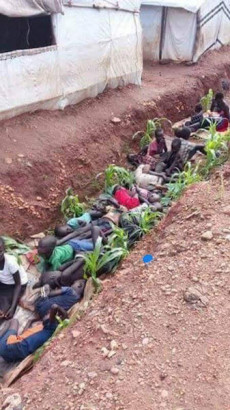African Children Pay the Cost of Wars
by Heather Robinson

Escaped slave and human rights advocate Simon Deng is joined today by South Sudanese-American human rights activist Jacinta Elioba and others protesting outside the Libyan consulate of the United Nations.
The reason for their protest?
Black Africans – including children – are fleeing African countries including Eritrea and South Sudan, and black Africans are being literally sold in slave markets in Libya.
Earlier this month, CNN and BBC released evidence of people being sold in slave markets.
“We felt people who are interested in the issue of slavery would care,” Deng told me via phone this morning. “That is why we are protesting at the United Nations.”
Increasingly in modern times, it seems humans’ primitive impulse to engage in violence paired with modern weapons takes its toll disproportionately on the world’s children.
According to UNICEF, almost 26,000 children – most of them unaccompanied and possibly orphaned – crossed the Mediterranean last year.
They are fleeing from countries that include Eritrea, Somalia, and South Sudan. In the latter nation, a civil war that started in 2013 and spiraled out of control has claimed tens of thousands of lives and turned one third of the country’s 12 million people – 4 million – into refugees.
School enrollment among children in South Sudan has plummeted, with only about 700,000 out of 2.5 million attending classes
Most are too scared to go to school, as they live in villages that are being frequently attacked by rival militias representing different ethnic groups.
Jacinta Elioba, the local New York City human rights activist who hails from South Sudan, met with me last week, providing some firsthand information on the international situation, as well as photographs of what is happening to children there (please see photo above). She said it was taken by a relative near a town called Yei and sent to her via cell phone.
Because children are often caught in the crossfire, targeted for sexual violence, or conscripted as child soldiers in South Sudan, most of them stay close to home if they can, or stay in refugee camps. Few go to school.
Elioba told me that infants and small children are dying in refugee camps because there is not enough baby-friendly food.
“In many cases, international agencies are providing corn, which is like what you make popcorn out of,” Elioba said. “But babies cannot eat that.”
Elioba, who self-financed a trip to Washington DC late last month to meet with members of USAID, said that female relatives with whom she has been in contact in South Sudan have explained to her that what they need for babies and young children is some sort of digestible baby food and cereal. Elioba said she carried this message to USAID.
“The fighting needs to stop,” said Elioba. “If these leaders were not selfish and they cared about people, they would stop.”
More to come.
This entry was written by Heather Robinson and posted on November 28, 2017 at 3:25 pm and filed under Blog. permalink. Follow any comments here with the RSS feed for this post. Keywords: blacks being sold into slavery, childrens-rights, Libya, slavery in Libya, South-Sudan, UNICEF, USAID. Post a comment or leave a trackback: Trackback URL. */?>



